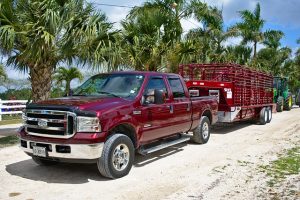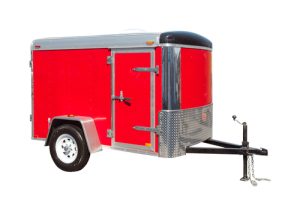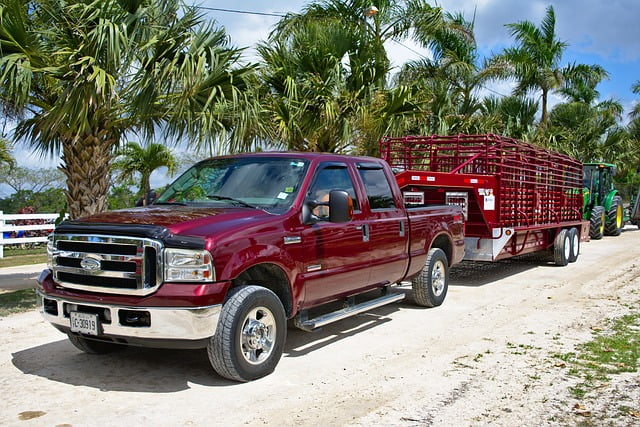If you are new to landscaping, something that you are going to learn is that there is a lot of landscaping equipment you’ll need. Having the right type of equipment is going to make a difference in how successful your business is.
Today we are going to look at two of the most basic yet important pieces of landscaping equipment – the truck and the trailer.
Landscaping Equipment – Your Truck

If you are going to be making a living doing this, you are going to need to be able to get to your clients’ properties. Although we all wish we could drive our mowers from house to house, this is probably not going to be the case.
I started with a 1998 Ford F150 that I used both as my personal vehicle, sales vehicle, and work vehicle. Times have changed.
Right now, I drive a 2002 Chevy S10. At the time I bought it a few years ago, it made sense to drive around a smaller, fuel-efficient vehicle since I was primarily using it to drive around for sales and as a personal vehicle. there was no need for a bigger truck.
My Field Manager, who does sales and supports the crews, drives around in a 2003 Chevy 1500. This truck has worked out well because a lot of times he needs to pick up supplies or haul a trailer to the job site. It can take a load if it has to.
For our grass trucks, we have a 1997 chevy 2500 and a 2002 Chevy 2500 with a dumper bed insert to easily dump grass and debris.
For our installation/project trucks, we use a 2003 GMC 3500 and a 1998 Chevy 3500.
If you noticed, we tend to stick with the Ford and Chevy trucks. Most would agree to stick with one or the other, I have had the best luck with Fords.
New or Used?
I have always purchased used vehicles my whole life. You are going to get the most value if you buy a used vehicle. After 5 years, the LEAST value a vehicle will lose is 50%. That means that if you buy a new dump truck for $60,000 in 2015 and keep it until 2020 if you are lucky, it will be worth $30,000 at the end of your ownership. For the next ten years of ownership, the vehicle will only cost you $30,000. Also to be considered is the cost of insurance on a new vehicle versus an old vehicle, which is much more expensive.
Criteria
When looking for a truck, I usually have the following criteria in mind when I search on Autotrader and Craigslist:
Cost: Between $5000 and $7000
Why do I have this criterion on the year, mileage, and price? I don’t know. I think because it seems that to get a truck that is going to last you any period, you need to spend this as a minimum. When we purchase trucks with this criteria we can usually get a good 5 years out of them at least.
I choose Automatic because I want any one of my employees to be able to drive any of the trucks. Things are complicated enough I don’t need another complexity of not only who is working today, what are their skills, but also can they drive standard?
I choose the bigger trucks (not the F150 or Chevy 1500) because they tend to be able to carry more weight, have a heavier duty front end (for towing trailers or loads), and are just more around built to be work trucks.
I do not have a preference on the fuel type at the type. I think I lean towards gas for the same reason as having automatic trucks. Diesel takes special care including fuel additives and warming up the coils on the engine that most people aren’t used to. Diesel supposedly lasts longer and gets better mileage, but their repairs and parts are much more expensive.
Dealership or Private Seller
I have always preferred to buy from a private seller whenever possible. With a private seller, you can see who owned the truck before you. You can judge their personality and how well they take care of their things. If they have a nice, tidy house, they probably also took care of their truck. Also, a private seller will not “dress up” their truck. It is what it is, not prettied up to show to you.
Unfortunately, dealerships tend to have most of the trucks I am always looking for. At a dealership, you don’t get any of the information you get from a private seller, and instead, you have a salesman in your face. The truck will usually be “dressed up” to be made look pretty and hide blemishes. Additionally, you will probably pay more.
Other tips
Here are some other tips that you can use for buying these two pieces of landscaping equipment.
- If you are not mechanically inclined, you can bring your truck to a mechanic to look it over for you or bring a handy friend with you.
- Never buy a truck that was used to plow! These trucks will have rust problems and are used much harder. Trust me on this one.
- I have found that it is much easier to find a well taken care of regular commuting truck than it is to find a well taken care of dump truck. You can always put a dump insert into a truck or put a new bed on it. Usually, trucks used as work trucks were used much harder and are in worse condition. Once you add on 4 wheel drive and a dump body, good luck finding a truck in good condition, especially if you don’t want it plowed with!
- Do your research regardless of your experience with the brand. For example, our 2003 Duramax was known for fuel injector problems, which I didn’t research. Being a $4000+ job, I wish I had searched on Google as this comes up in all search results.
Landscaping Equipment – Your Trailer

If you have a landscaping company, you are probably going to have a trailer as a piece of landscaping equipment. It is possible to use ramps to load your mower into the back of a pickup in the beginning, but hopefully, you quickly move past this phase.
Some companies I have seen use flatbed trucks which I could see how it would have its advantages but then you have very limited room to put debris (no truck bed).
Most landscape companies used open trailers. These are a little cheaper (you can find a used, single axle trailer for under a thousand dollars). These work, but I prefer an enclosed trailer as pictured above.
I ended up using enclosed trailers for the following reasons:
1) They keep your equipment dry
2) They protect your equipment safe from theft and
3) They serve as a moving billboard
The only advantage to an open trailer is your equipment is more readily accessible, as in you don’t have to walk inside the trailer to grab what you need you can grab it standing from the site of the truck.
A new, enclosed, 12 ft dual axle trailer runs about $5-6000 in my area. You will be given many cheap options when you buy a trailer but you get what you pay for.
A few things I would look for when purchasing an enclosed landscaping trailer:
1) Bowed ceilings (not flat, not enough headroom)
2) 3/8 inch plywood. You want the thick, heavy-duty stuff
3) Brand name, quality axles
4) LED lighting (don’t have to worry about replacing the bulbs)
Inside the trailer, you have to arrange your equipment. We keep 2 mowers as well as a push mower , as well as 2 weed whackers, 2 backpack blowers, 2 gas cans, and miscellaneous other small equipment. How do you store all this stuff?
If you don’t keep your equipment organized, it will end up getting tossed and turned and smashed. Especially once you have employees that don’t respect it because it isn’t theirs.
I have looked into different mounting systems, as there are specialized companies that well custom mounts to hang landscaping equipment. Since they were overpriced, I found alternate ways to store the equipment that has been very effective for us and much less expensive.
Our trimmer line holder is mounted to the inside of the door. This makes for quick and easy access for trimmer spool re-stringing.
Our mowers are parked in the trailer and small pieces of 2x4s are screwed into the floors to hold them into place. These are placed both vertically (to keep the mower from crashing into the walls) and horizontally (to keep the mower from rolling backward).
We have shelving for the backpack blowers, gas cans, and other tools.
Our trimmers are mounted to the walls with simple home depot U brackets screwed into the walls.



